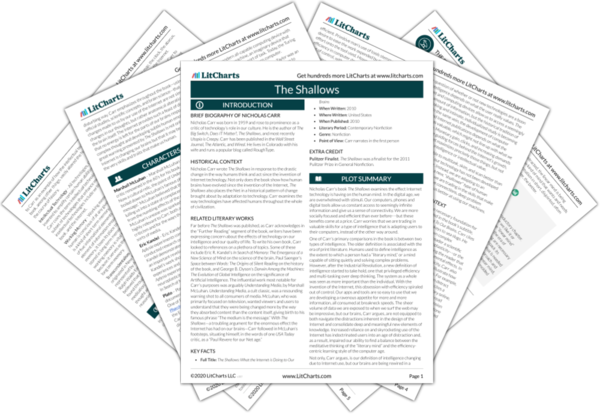Carr’s argument in The Shallows––that the Internet and computer technology are changing our brains––relies heavily on historical context. In order to show how the technology of the current digital age affects thinking, Carr explores how previous technologies formerly shaped the human mind. Put another way, he argues that the Internet is just the most recent development in humanity’s relationship with skill-enhancing tools.
All technology exists, in Carr’s view, to extend and amplify pre-existing sets of human abilities. Just as the plow amplifies human strength and the microscope amplifies eyesight, computers amplify thinking. Carr terms this latter category of tools, the ones we use to extend mental powers, “intellectual technologies.” Examples include the map, the clock, the abacus, the alphabet, the book and––of course––the Internet.
Putting the Internet in a historical context allows Carr to extrapolate meaning from the past. When the first ancient Sumerians scratched a character in the dirt they didn’t realize they were altering the course of humanity. Carr’s point is that the Internet, humanity’s most all-consuming tool by far, should be analyzed with the same far-reaching gravity.
The History of Technology ThemeTracker

The History of Technology Quotes in The Shallows
Although the use of any kind of tool can influence our thoughts and perspectives––the plow changed the outlook of the farmer, the microscope opened new worlds of mental exploration for the scientist––it is our intellectual technologies that have the greatest and most lasting power over what and how we think.
Sometimes our tools do what we tell them to do. Other times, we adapt ourselves to our tools’ requirements.
The written word liberated knowledge from the bounds of individual memory and freed language from the rhythmical and formulaic structures required to support memorization and recitation. It opened to the mind broad new frontiers of thought and expression.
The words in books didn’t just strengthen people’s ability to think abstractly; they enriched people’s experience of the physical world, the world outside the book.
The way the Web has progressed as a medium replays, with the velocity of a time-lapse film, the entire history of modern media.
We don’t see the forest when we search the Web. We don’t even see the trees. We see twigs and leaves.
[The book] loses what the late John Updike called its “edges” and dissolves into the vast, roiling waters of the Net. The linearity of the printed book is shattered, along with the calm attentiveness it encourages in the reader.
In arguing that books are archaic and dispensable, Federman and Shirky provide the intellectual cover that allows thoughtful people to slip into the permanent state of distractedness that defines online life.
In the choices we have made, consciously or not, about how we use our computers, we have rejected the intellectual tradition of solitary, single-minded concentration, the ethic that the book bestowed on us. We have cast our lot with the juggler.
What we are experiencing is, in a metaphorical sense, a reversal of the early trajectory of civilization: we are evolving from being cultivators of personal knowledge to being hunters and gatherers in the electronic data forest.
When we extend some part of ourselves artificially, we also distance ourselves from the amplified part and its natural functions.











